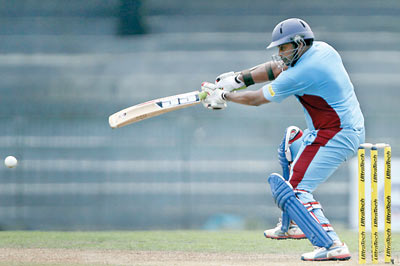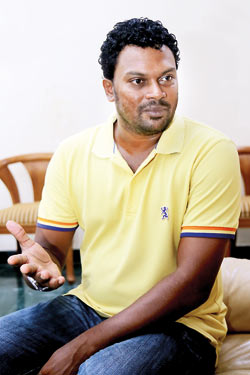Was he another victim of the system?

Kandamby, when he was in top form
Almost all his career as a specialised middle-order batsman Thilina Kandamby’s fortune was overshadowed by misfortunes. So was his untimely retirement, by the ongoing ICC World Twenty20 Championship 2016 in India. For Kandamby, who will turn 34 in 69 days, misfortune has been part and parcel during his not-so-impressive and unutilised career, which spanned for almost 12 years. But overall he could be considered as another victim of the system, which Sri Lanka Cricket (SLC) is yet to fathom or are keen to explore.
“Definitely there is a big flaw in the system. I don’t know where or how it had happened but there is and it will be a hard task to get it back in working order or in a viable condition soon. Otherwise Sri Lanka will not be in a position like this internationally today. Most players wouldn’t opt to leave the country to play county or league cricket in other countries,” a disheartened Kandamby told the Sunday Times. According to Kandamby, he and over 100 other cricketers were part of the SLC central contract for the past eight years.
But out of nowhere when the cricket administrators cut that number down by more than a half last year, that’s when he started feeling unsafe as a professional. While over 50 cricketers, who had represented Sri Lanka at some point, decided to leave the country for greener pasture in Australia or England, to try their luck in cricket, Kandamby is one of the few handful players who opted to stay back. The mass exodus may have opened new avenues to fresh legs in First Class cricket, but Kandamby feels that it’s the unnoticed reason to the downfall of domestic cricket, which in return had affected greatly even to Sri Lanka’s trademark at international level.

According to Kandamby, he might consider cricket coaching in time to come - Pic by Anuradha Bandara
“If the governing body is planning in spending money, they should do it comprehensively and effectively, totally focusing on the main side. A team can only accommodate 11 players but Sri Lanka has plenty of talent. Players should be the main focus, they must be protected. If the players fail at top level, they should be drafted to an alternative pool than the ‘A’ side, so that they can work out on their lapses and make a return. What happens today is, when players are dropped from the main side, their entire career is put in jeopardy. It spreads deep that the affect even makes a great impact to their personal and family lives. They don’t know where they stand. If they perform well at club level, sometimes they are still overlooked. The reason what the officials give is that the club system is below par standard. Then at what level should the players perform, how can they prove that they are fit enough to make a return?” questioned Kandamby, who was man enough to face the challenge on the land he was born.
Futilely he attempted a return to the Sri Lanka team for nearly two years and eventually decided to throw the towel after convincing his mother and beloved wife, who thought it was still too early for him to retire. When Kandamby decided to go public on his decision it was again taken over by the step down of the Sri Lanka Twenty20 captaincy of Lasith Malinga few days before the commencement of the ICC Twenty20 World Championship. But Kandamby feels he is lucky given the facts that he was given opportunities, sometimes much less than other cricketers.
“I’m happy of my accolades if I compare my career with others like Waruna Waragoda or Sajith Fernando, who never got an opportunity to represent the country. I have played 39 ODIs and five Twenty20 Internationals unlike them. That’s where I consider myself lucky and I was more privileged than them. But I’m still puzzled as to why I was not given opportunities when I was able and performing well.
I was always mystified by the rationale behind selecting me when I was underperforming. Many say that I did not utilise the given opportunities correctly. True that, but if you consider the opportunities some got, I was given only a handful. But comparing what players like Waruna and Sajith got, yes, I definitely feel lucky and also feel that I didn’t try hard enough. When I was at my peak in performance just before the ICC World Cup in 2011, I was told to sit out by the selectors. What they told me was it was that I was in great shape but they wanted to give others the opportunity to show their capacity. Of course when the selectors have that sort of intention they will consider whoever that performs well at selection trial games. I had to face such situations too. So I missed that World Cup hope, unfortunately at a time when I was performing perfectly well,” stated Kandamby who had only one regret in his entire career.
“If I had any regrets that was not being able to play Test cricket. If a cricketer’s real strength needs to be tested, it is through Tests. It will prove a cricketer’s real ability. Unfortunately I had to sit out on the bench at 15 Test matches. I never got an opportunity to prove my capability even after scoring centuries against New Zealand, England and India in side games. Our Test teams at that time were at full strength. Even the selectors were clueless where I fitted and they had categorized me as an ODI player. But I always thought I should have been a better player at Tests. If I had any regrets in my career that would be for being unable to do that.” Kandamby’s statement reflects the lapse of a comprehensive selection policy by the SLC hierarchy, who is of the view that the domestic competition does not fit the need of the system or country. But Kandamby strongly feels that what has affected Sri Lanka’s performances as a unit at global stage is a collective and gradual result of shortsightedness of cricket administrators who base the whole process on the vote strength of the cricket playing clubs. He thinks a quick remedy is needed to address the issue, leaving aside personal or other agendas.
Kandamby who has not fulfilled the promise he showed as a schoolboy at Ananda College, was however good enough to captain the Sri Lanka Under-15, Under-17 and Under-19 teams. After leading the Sri Lanka Under-19s in Australia where he won the player of the series award in 2000, Kandamby was drafted to the Sri Lanka ‘A’ side where he toured India and hit five half centuries. This performance helped him to be names for Sri Lanka’s tour to New Zealand. But he made his debut in Sri Lanka’s tour to Zimbabwe in 2004 and lack of consistency cost him the place he earned after just four ODIs. He had to wait for three years before making a return but Kandamby’s peak hit in 2009 when he was named for Sri Lanka’s Test squad against India. But competition among batsmen coupled up with misfortunes caused Kandamby losing his place for several years including at the 2011 World Cup. In June the same year, following several months of tumult in the Sri Lanka team, he returned to the ODI squad as vice captain, and went on to lead the Twenty20 team against England at Bristol. Since then his attempts have gone futile despite performing well at domestic level, which he feels is in need of a revamp.
“If the club competition does not possess the required standard, they must make correct remedy to lift it to the required level. There are over 50 players now in exile in countries like Australia and England playing lower division cricket for money, because cricket today is a professional game. The local authorities could bring them all back and make them play in the intended domestic competition so the current local players, whom they have categorised as substandard, can improve and the competition will be higher than it is now. If you take one-time national caps, who are now playing for other countries, their experience can be shared with others at domestic level. Those players must be provided with a contract so by playing them at domestic competitions at least others could learn through them. Today there are players but not the talent that is required at international level; there are enough of clubs but no integrity in the competition. A provincial based tournament is also a good thing. But that cannot bring the loyalty a player has to their respective clubs. These are serious cases that need to be addressed fast. Or else the country will face the bad effects of it,” Kandamby, who is looking forward to turn a new leaf in life with a business venture, stated.


